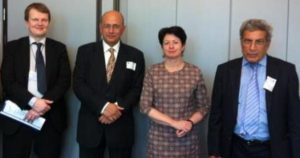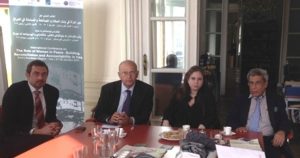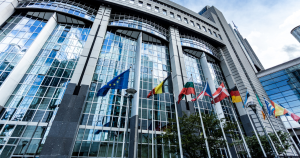Brussels, 17-19 March 2014
On 17-19 March 2014, as part of a week-long tour of major European Cities, a Bahraini Delegation of opposition leaders visited Brussels for a series of meetings with EU institutions and human rights organisations, organised with the support of No Peace Without Justice. The visit aimed at drawing attention to the current situation in Bahrain and also to work with international partners in efforts to consolidate a serious and meaningful dialogue process that can lead to genuine democratic reform. The delegation included Dr Jasim Husain, Resigned member of Bahrain’s Council of Representatives of Al Wefaq, and Dr Abdulnabi Al Ekry, President of Bahrain Transparency Society and member of “Waad” Society (National Democratic Action Society).
On this occasion, No Peace Without Justice (NPWJ) hosted and arranged for meetings with leading human rights NGOs, including FIDH, Human Rights Watch, Amnesty International and Front Line Defenders. Meetings were also organised with MEP Barbara Lochbihler, Chair of the Sub-Committee on Human Rights of the European Parliament, and Angelika Niebler, President of the Delegation for relations with the Arab Peninsula of the European Parliament, as well as with officials of the European External Action Service (EEAS) in charge of GCC Countries.

The Bahraini delegation took opportunity of these meetings to highlight the ongoing deteriorated human rights situation in the country. Almost three years after its violent response to citizens’ rallies demanding political reform, the regime in Bahrain has failed to deliver any meaningful reform program. Worse, it continues to suppress peaceful dissent through severe restrictions on the right to freedom of expression and association. Prominent civil society activists and human rights defenders, including minors, are still being exposed routinely to harassment, arbitrary detention and imprisonment, ill-treatment and unfair and politically motivated trials leading to harsh sentences for having participated in peaceful demonstrations or criticised officials.

As highlighted by Dr Husain and Dr Al Ekry, if Government of Bahrain is sincere about reform, it must, first and foremost, release all remaining prisoners of conscience and human rights defenders in detention for exercising their right to free expression and peaceful assembly be released without further delay. The Government of Bahrain must also establish credible and impartial accountability mechanisms to address past violations and to prevent continuing abuses, as recommended by the BICI report and the UPR mechanism. Bahraini authorities should also cooperate fully with the human rights monitoring mechanisms of the United Nations and its Special Rapporteurs, in order to allow for an independent assessment of human rights conditions, particularly on freedom of association and assembly, on the situation of human rights defenders, torture and free trial.
Dr Husain and Dr Al Ekry also underscored that, despite the current crisis, the commitment of the majority of Bahrainis to reform geared towards a future based on respect for human rights, application of the principle of non-discrimination, accountability for violations and women’s participation in public and political life gives hope for a better future. International support and engagement throughout the region is therefore essential to bring the country in the right path and will help anchor Bahrain to democracy and rule of law and to restore peace, stability and development.
Documentation
- NPWJ Policy Paper on Bahrain
- Special section on NPWJ Bahrain Project
For more information contact Gianluca Eramo, email geramo@npwj.org / tel: +32 2 548 39 1, or Nicola Giovannini, email ngiovannini@npwj.org / tel: +32 2 548 39 15.




